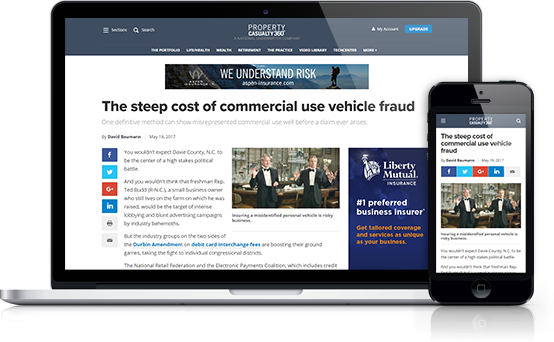WalletHub: States where auto loan rates increased the most
New car buyers are in a financial squeeze.
 |
I’ve long been a vocal and adamant proponent of the relationship factor as the cornerstone of all business. As they say in Dynamics of Selling, the relationship card trumps the price, service and coverage cards. Relationships in business mirror personal relationships–meaning that they can become dysfunctional and difficult to maintain, just like with family and friends. Nonetheless, they must be maintained.
Here’s an example with which everyone should be able to identify. An agent friend recently lost the workers’ comp insurance for a longtime client. Over the years, he had developed a good relationship with the ownership of this company and didn’t see a cloud on the horizon. But like a perfect storm, several forces came into play:1. Due to the soft market, the agency was putting a lot of energy into cultivating new business, sometimes to the detriment of existing clients.2. The client had recently hired a new general manager, who brought a new financial officer with him.3. Insurance company direct billing was in force.The carrier sent a renewal invoice at the prior year’s premium rate. The financial officer was looking for a way to cut costs to justify outsourcing payroll processing. This financial person also had a prior relationship with a company that offered workers’ comp insurance as an addendum to their payroll processing operation. The agent soon found himself in a “quote and requote” battle, trying to save the account.As a last effort, the agent played his trump card: his relationship with the owners. Although the owners acknowledged the relationship, they felt it was good management to support the decision of their new team.Could this account have been saved? I believe so–if the agent had been proactive with the relationship. You are less likely to save an account on a reactive basis. The major mistake was not working on the renewal prior to the invoicing. Once you get into a premium negotiation war, a certain amount of credibility is lost and you may not be able to save an account without the lowest price.New management within an existing account requires immediate action from the incumbent agent. Every new manager is looking for ways to “make their bones” in the organization. Probe to find out their particular pains and issues. Determine what they hope to accomplish and any specific problems they have targeted. Then, bring resources to the table to help them. As with any new prospect–and that’s what new management is–you must invest in the relationship before you can reap the rewards.Relationship dynamicsRelationships, business and personal, invariably have their ups and downs. Good relationships can become dysfunctional. Feelings of being taken for granted can engender a roving eye. Sometimes outside forces exert a powerful influence. Studies show that nearly two-thirds of business relationships fail because the client experiences a general sense of indifference. Under this cloud, the customer may begin to question the level of service. Over time, the client begins looking for someone who will appreciate and value their business.The dynamics here are like the couple that gets divorced after 20 years. First, their attention was diverted to the needs of the children and they began to talk less. Conversations centered on the mundane aspects of their life, not the heart-to-heart communication of the early years. As communication shriveled, they began seeking singular diversions. One was at the golf course, the other at the tennis court. As the children began leaving, each felt neglected and, without intervention, the marriage failed.Could the marriage have been saved? Undoubtedly, but it takes work. Better communication, true concern for the betterment of each other, and a willingness to make concessions and compromises are the nutrients that nurture a relationship. Business relationships require similar care and attention.Relationship realitiesOn the other hand, sometimes relationships end and there isn’t anything that can be done to salvage them. A company moves out of your geographical area. New management brings in pre-existing vendors. A client dies or goes out of business. It’s a long list, and the reality is that there are some things you just can’t do anything about.Our company just lost a client after 25 years of working together. In fact, we took pride in the fact that this client had been our very first customer. Over the years, the relationship survived a sale by the original owner to a large chain operation and several management changes. The relationship expanded to include six additional locations within the chain. Yet we lost the account.Our client decided to replace their advertising agency. The new agency viewed our marketing company as a threat, rather than a partner and a resource. The agency was acting out of paranoia based on a prior bad experience with a marketing company. To get us out of the picture, the agency replicated our services and gave them to the account for free–and free is a pretty good price.Could the account have been saved? No. It was in the best financial interests of my client to take the free services and run with them. Might the account come back? Yes. In fact, we endorsed their decision and told them we would be ready to serve their needs again should anything change in the future–as it always does.Market factorsThe hard and soft variances within our marketplace will often test a relationship’s mettle. Although you might privately long for the rising premiums and commissions of a hard market, could you confess that to a client? Conversely, are you willing to complain to a client that your commissions are dwindling because they’re paying lower premiums this year? The reality is that there are opportunities and difficulties with hard and soft markets. The objective is to nurture your existing relationships and leverage market conditions to develop new ones.In this soft market, an agent must avoid the appearance of self-serving greed. Your existing clients have invested time, confidence and loyalty with you. Do you take advantage of their trust by quoting higher than you would for a new prospect in a competitive scenario? Remember, your competition may be quoting them as “new prospects.” Client retention is essential to the long-term financial success of an agency. Think twice before leveraging your commissions on the backs of your existing book. Loyalty is a two-way street.That said, you don’t necessarily have to cut everything to the bone. If you know your clients and their particular pains, you can justify higher premiums by value-added resources. Providing solutions to their problems will help cement the relationship and retain the account–provided you stay on top of their continually changing concerns. That’s where a functional relationship comes into play. Relationships flourish when both partners want the best for each other. They wither when selfish concerns overpower other needs.Nurturing pays offIn his new book, “Nurturing Customer Relationships,” Jim Cecil draws an analogy from Asian farmers of black bamboo. The timeframe from planting to harvest is five years.During that time, the crop is at peril from numerous dangers, such as weeds, floods, droughts and storms, or even simple neglect by the farmer. Yet, for the patient farmer who systematically nourishes and protects the crop, the harvest can be bountiful.Relationships, new or old, are like the bamboo crop. They require constant attention and care. Here’s a little test. There are no right or wrong answers, just your answers. If you’re honest with yourself, you’ll intuitively know if your answers place you on the right relationship track.1. How frequently do you proactively communicate with your clients?2. What value do you bring your clients when making contact?3. How much of your life do you share with your clients and they with you? 4. When was the last time you celebrated a client’s success?5. Do you remember important anniversaries?6. Do you know the names of your client’s spouse and children?7. Do you provide resources beyond insurance?8. Do your clients share their short- and long-term dreams, plans and goals? 9. Do you share yours?10. When was the last time you told a client how much value they bring to your business and your life?There’s one simple truth that can germinate any relationship and hold it in good stead through the years: Treat your clients and prospects as you would have them treat you.Jack Burke is the president of Sound Marketing Inc., editor of ProgramBusinessNews, host/producer of Audio Insurance Outlook, author of “Creating Customer Connections and Relationship Aspect Marketing,” and faculty member of the Marketing & Sales James K. Ruble Seminars. He can be reached by phone at 800-451-8273, by e-mail at [email protected] or on the Web at www.soundmarketing.com. For more information on the Dynamics of Selling program, call 800-633-2165 or visit www.thenationalalliance.com.
Already have an account? Sign In Now
NOT FOR REPRINT
© 2025 ALM Global, LLC, All Rights Reserved. Request academic re-use from www.copyright.com. All other uses, submit a request to [email protected]. For more information visit Asset & Logo Licensing.
New car buyers are in a financial squeeze.
New technology juggles storm water risk, urbanization and climate change.
Here's why user-experience integration is key to a successful deal.
Guide
Sponsored by CoreLogic
How Digital Automation Operates in Today's Property Claims Lifecycles
Discover how digital automation is helping property insurance carriers simplify and expedite the claims process and overcome challenges posed by a growing number of claims in recent years.
Case Study
Sponsored by CoreLogic
Revolutionizing Claims Processing: How a Leading Insurer Transformed Water Mitigation Reviews
Discover how one insurer drastically improved the efficiency of their water mitigation claim reviews, reducing costs and time while enhancing decision-making. Learn how this approach can transform your claims process, making it faster, more accurate, and less resource-intensive.
Article
Sponsored by TruStage
Filling the Middle-Market Life Insurance Gap in America
The mid-market life insurance segment holds tremendous potential, with 39% of consumers planning to buy life insurance in the next year (1). This white paper explores the unique opportunities for you to scale your mid-market segment and drive sustainable growth.
 Copyright © 2025 ALM Global, LLC. All Rights Reserved.
Copyright © 2025 ALM Global, LLC. All Rights Reserved.



